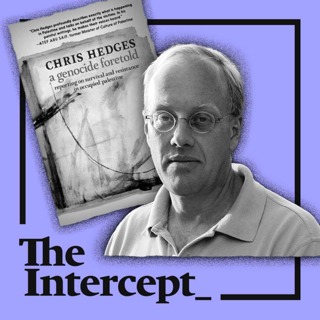
The Indiscriminate Rain of Cluster Bombs
The United States sent cluster munitions to Ukraine, bombs banned by 123 countries due to how they kill and maim indiscriminately over a wide area and for years after a conflict. This week on Intercepted, Marc Garlasco — the military adviser at PAX, a Dutch nongovernmental organization where he works to protect civilians in armed conflict, joins Jeremy Scahill and Murtaza Hussain to discuss how cluster munitions kill civilians during war and long after, and why their use — even by the United States — should be considered a war crime.If you’d like to support our work, go to theintercept.com/join — your donation, no matter what the amount, makes a real difference.And if you haven’t already, please subscribe to the show so you can hear it every week. And please go and leave us a rating or a review — it helps people find the show. If you want to give us feedback, email us at Podcasts@theintercept.com. Hosted on Acast. See acast.com/privacy for more information.
19 Heinä 20231h

A Teen Slain by Police Uproots France
The fatal police shooting of 17-year-old Nahel Merzouk during a traffic stop in Paris, France, sparked days of protests across the country. This week on Intercepted, host Murtaza Hussain is joined by Yasser Louati, a French political analyst and human rights advocate to discuss how Merzouk’s death struck at the fault lines underlying social discontent building in the country and the increasing power of the police.If you’d like to support our work, go to theintercept.com/join — your donation, no matter what the amount, makes a real difference.And if you haven’t already, please subscribe to the show so you can hear it every week. And please go and leave us a rating or a review — it helps people find the show. If you want to give us feedback, email us at Podcasts@theintercept.com. Hosted on Acast. See acast.com/privacy for more information.
12 Heinä 202348min

CIA Arms Dealer Was Actually DEA Target
In 2016, Flaviu Georgescu was found guilty and sentenced of attempting to traffic weapons to the Revolutionary Armed Forces of Colombia, an insurgent group on the U.S. terror list. But when he was arrested by Drug Enforcement Administration agents, he told the officials he was working for the CIA. This week on Intercepted, Trevor Aaronson, contributing writer with The Intercept, joins host Murtaza Hussain to discuss Georgescu’s case. In the second season of Aaronson’s podcast, "Alphabet Boys," Aaronson tells the story of the DEA operation against Georgescu and how he was targeted by a paid DEA informant. Georgescu, however, had reported the attempted arms trafficking to the CIA and believed he was collecting intelligence for the agency. Aaronson and Hussain discuss their reporting on the case and how the U.S. government may be manufacturing the very crimes they claim to stop. The second season of "Alphabet Boys" is out now.If you’d like to support our work, go to theintercept.com/join — your donation, no matter what the amount, makes a real difference.And if you haven’t already, please subscribe to the show so you can hear it every week. And please go and leave us a rating or a review — it helps people find the show. If you want to give us feedback, email us at Podcasts@theintercept.com. Hosted on Acast. See acast.com/privacy for more information.
28 Kesä 202348min

Turkish Elections: Erdogan’s Autocracy Continues
This week, the Turkish government announced it will raise its monthly minimum wage by 34 percent to address inflation and the economic crisis in the country. Despite the long-standing problems in Turkey, President Recep Tayyip Erdogan recently won a contested reelection, further consolidating his 20-year rule. This week on Intercepted, Gönül Tol, the founding director of the Middle East Institute’s Turkey program, joins Murtaza Hussain to discuss the Turkish elections. Tol runs through Erdogan’s decadeslong history in office, how economic and social problems in Turkey contributed to the election’s rhetoric, and what Turkey’s future may look like under Erdogan’s autocratic government.If you’d like to support our work, go to theintercept.com/join — your donation, no matter what the amount, makes a real difference.And if you haven’t already, please subscribe to the show so you can hear it every week. And please go and leave us a rating or a review — it helps people find the show. If you want to give us feedback, email us at Podcasts@theintercept.com. Hosted on Acast. See acast.com/privacy for more information.
21 Kesä 202355min

Ukraine on the Offensive
The Ukrainian military’s counteroffensive against Russia is underway. Aided by the U.S. and other Western powers, Ukraine is making a push to expel Russian troops. This week on Intercepted, Jeremy Scahill and Murtaza Hussain are joined by Rajan Menon, the director of the Grand Strategy program at Defense Priorities and author of several books, including "Conflict in Ukraine: The Unwinding of the Post-Cold War Order.” Menon was recently in Ukraine, and he describes the developments in the country, more than one year since the Russian invasion began. Menon breaks down the regional differences in Ukraine and the geopolitical challenges to ending the conflict.If you’d like to support our work, go to theintercept.com/join — your donation, no matter what the amount, makes a real difference.And if you haven’t already, please subscribe to the show so you can hear it every week. And please go and leave us a rating or a review — it helps people find the show. If you want to give us feedback, email us at Podcasts@theintercept.com. Hosted on Acast. See acast.com/privacy for more information.
14 Kesä 202354min

Monetary Blowback: How U.S. Wars, Sanctions, and Hegemony Are Threatening the Dollar’s Reserve Currency Dominance
This week, strategists at JPMorgan, the biggest U.S. bank, warned there are signs of “de-dollarization” around the world. Dedollarization is the push by countries, including Brazil, Russia, India, China, South Africa, and others, to move away from the U.S. dollar as the world’s primary reserve currency. This move poses a big challenge to U.S. economic hegemony. This week on Intercepted, Canadian businessperson and mining financier Frank Giustra joins Jeremy Scahill and Murtaza Hussain to discuss the prospective move toward nations’ dedollarization. Giustra breaks down the history of how the U.S. dollar became the world’s primary reserve currency. Scahill, Hussain, and Giustra then discuss the different nations and the political and economic motivations to dedollarize and how the U.S. government may respond in order to maintain its economic hegemony.If you’d like to support our work, go to theintercept.com/join — your donation, no matter what the amount, makes a real difference.And if you haven’t already, please subscribe to the show so you can hear it every week. And please go and leave us a rating or a review — it helps people find the show. If you want to give us feedback, email us at Podcasts@theintercept.com. Hosted on Acast. See acast.com/privacy for more information.
7 Kesä 20231h 3min

Imran Khan’s Ousting and the Crisis of Pakistan’s Military Regime
For the past few weeks, former Pakistan Prime Minister Imran Khan has been at the center of an unprecedented political crisis. In the lead-up to new elections, Khan was arrested and released on corruption charges intended to keep him out of his office. Meanwhile, his supporters have been facing off against the military, as the armed forces crack down on his political party in a campaign aimed at excluding them from political life. The conflict drives at the heart of the most important issue in Pakistani politics: the reality of military rule. This week on Intercepted, Jeremy Scahill and Murtaza Hussain are joined by Omar Waraich — a journalist, human rights advocate, and former head of South Asia for Amnesty International. Waraich provides the historical context, explains the Pakistani military’s role in the country, and where U.S. relations with Pakistan stand.If you’d like to support our work, go to theintercept.com/join — your donation, no matter what the amount, makes a real difference.And if you haven’t already, please subscribe to the show so you can hear it every week. And please go and leave us a rating or a review — it helps people find the show. If you want to give us feedback, email us at Podcasts@theintercept.com. Hosted on Acast. See acast.com/privacy for more information.
31 Touko 202353min

Henry Kissinger’s Bloody Legacy
An Intercept investigation, years in the making, reveals previously unpublished, unreported, and underappreciated evidence of hundreds of civilian casualties that were kept secret during the conflict in Cambodia and remain almost entirely unknown to the American people. This week on Intercepted, host Murtaza Hussain talks to Nick Turse, an investigative journalist and contributing writer for The Intercept, about his work to uncover the mass violence Kissinger ordered and oversaw in Cambodia while the U.S. carpet-bombed the country between 1969 and 1973. Turse’s investigation, “Kissinger’s Killing Fields,” is based on previously unpublished interviews with more than 75 Cambodian witnesses and survivors of U.S. military attacks in 13 Cambodian villages so remote they couldn’t be found on maps. Their accounts reveal new details of the long-term trauma borne by survivors of the American war.“It was very hands on. Kissinger was picking where bombs would be dropped in Cambodia,” Turse says. “The authentic documents associated with these strikes were burned and phony target coordinates and other forged data were supplied to the Pentagon and eventually Congress.” Experts say Kissinger bears significant responsibility for attacks in Cambodia that killed as many as 150,000 civilians — six times more noncombatants than the United States has killed in airstrikes since 9/11.Check out the full "Kissinger’s Killing Fields" project at TheIntercept.com.If you’d like to support our work, go to theintercept.com/join — your donation, no matter what the amount, makes a real difference.And if you haven’t already, please subscribe to the show so you can hear it every week. And please go and leave us a rating or a review — it helps people find the show. If you want to give us feedback, email us at Podcasts@theintercept.com. Hosted on Acast. See acast.com/privacy for more information.
25 Touko 202354min






















